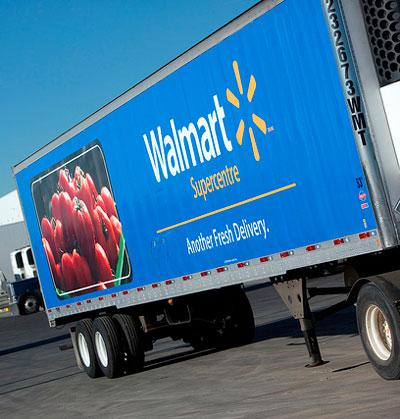This is the seventh article in a special 9-part series written by ILSR’s Stacy Mitchell and published by Grist. You can read the whole series here.
In 2006, Walmart made headlines when its vice president for corporate strategy and sustainability, Andrew Ruben, told a congressional committee that the company “would accept a well-designed mandatory cap-and-trade system for greenhouse gases.” Other major U.S. companies had spoken favorably of cap-and-trade, but Walmart made a bigger splash. Not only was it America’s second-largest corporation; it also had deep roots in the country’s coal-burning heartland.
But even as Ruben was delivering his testimony, Walmart’s political action committee (PAC) was funneling a river of campaign cash into the coffers of lawmakers who would ensure that the U.S. did absolutely nothing to curb its greenhouse gas emissions. During the 2007-2008 election cycle, 80 percent of Senate campaign contributions that came from Walmart’s PAC and large donors employed by the company went to senators who helped block the Lieberman-Warner cap-and-trade bill, according to data on political giving published by the Center for Responsive Politics. (When the bill arrived on the floor in 2008, it came up 12 votes shy of the 60 needed to overcome a filibuster.)
Over the last decade, Walmart has emerged as one of the country’s largest funders of political campaigns. Its dollars skew heavily in favor of candidates who routinely vote against the environment. Since the company launched its sustainability campaign in 2005, 40 percent of the $3.9 million it has given to members of Congress went to those who have lifetime scores of 20 or less on the League of Conservation Voters’ National Environmental Scorecard – meaning they vote against the environment 80-100 percent of the time. Another 19 percent went to those who vote against the environment 50-79 percent of the time.
Walmart’s largest donations have gone to some of the nation’s most powerful climate-change deniers. Since 2005, Walmart’s PAC has given $25,000 to House Speaker John Boehner, R-Ohio (“the idea that carbon dioxide is a carcinogen that is harmful to our environment is almost comical”); $30,000 to Sen. Roy Blunt, R-Mo. (“there isn’t any real science to say we are altering the climate path of the earth”); and $29,500 to Sen. John Boozman, R-Ark. (“you can look back at some of the previous times when there was no industrialization, you had these different ages, ice ages, and things warming”).
Walmart gets political
Walmart wasn’t always a big political donor. Sam Walton, the company’s founder and leader until his death in 1992, didn’t believe in supporting campaigns. That view largely held through the 1990s, when Walmart’s donations at the federal level never exceeded $250,000 during an election cycle. Then, in the early 2000s, facing increasing opposition and a spate of state and federal bills that could affect its bottom line, Walmart decided it had to curry favor. It sharply increased both its political donations and its lobbying. Over the last five election cycles, Walmart has contributed over $8.5 million to federal candidates and political parties, making it one of the largest corporate donors in the country.
Between 2000 and 2006, Walmart gave nearly 80 percent of its federal contributions to Republicans, but by 2008, that figure had dropped to 55 percent. Still, the company pushed hard to defeat Barack Obama, as revealed in an embarrassing front-page Wall Street Journal story in August 2008. The article described how the company was holding mandatory meetings for store managers and department heads to make it clear that voting for Obama was tantamount to welcoming unions into Walmart.
The exposé came at a bad time. Walmart had launched a sophisticated PR operation to persuade liberals in the Northeast and West Coast, where its expansion plans had run into roadblocks, that it was a changed company and had come to embrace their green and community-minded values. Turning out the vote against their preferred presidential candidate did not fit the script.
Since then, Walmart has made even more of a point of giving to Democrats. The Washington Post has reported that the company now provides as much support to Democrats as Republicans. In the 2010 cycle, 53 percent of Walmart’s federal-level donations went to Democrats.
But a closer look reveals that Walmart’s giving is not so even-handed. In the Senate, Walmart has continued to favor Republicans, helping them turn the chamber into a major roadblock preventing federal action on climate change and other pressing issues. More than two-thirds of Walmart’s Senate donations in 2009-2010 went to Republicans.
In the House, more than half of Walmart’s contributions went to Democrats in 2009-2010, but the company favored those who tend to vote more like Republicans on environmental issues. Walmart made donations to 46 percent of all House Democrats in 2010, but it funded nearly 70 percent of those who voted against the cap-and-trade bill that passed the House in 2009. Conversely, Walmart supported only 18 percent of the 119 House Democrats who had a perfect score on the LCV’s 2010 scorecard.
Lopsided at the state level
Less noticed has been Walmart’s campaign funding at the state level, which remains sharply skewed. In 2009-2010, 77 percent of Walmart’s donations to state candidates and parties went to Republicans, according to the National Institute on Money in State Politics. Since 2003, the company has given a total of $9.9 million at the state level, with almost 80 percent flowing to Republicans.
Among the top 10 state-level recipients of Walmart’s cash during this period are three prominent climate-change-denying governors: Rick Perry (R-Texas), Mitch Daniels (R-Ind.), and Bob McDonnell (R-Va.). Also on the list are Pennsylvania’s Gov. Tom Corbett (R) and Lt. Gov. Jim Cawley (R), both of whom have been waging a veritable crusade on behalf of the natural-gas fracking industry.
One state attorney general also made Walmart’s top-10 list: Wisconsin’s J.B. Van Hollen. His biggest environmental claim to fame came shortly after he took office in 2007, when he unilaterally decided to withdraw Wisconsin from a multi-state lawsuit challenging a Bush administration directive that relaxed rules on coal-burning power plants.
Walmart talks big about sustainability, but doesn’t put its campaign money anywhere near where its mouth is. Whatever the company may say about the importance of legislative action on climate change or other environmental issues, its money is signaling the opposite, telling lawmakers that it’s perfectly fine to vote against environmental protection.
Next up: Walmart controls a giant chunk of our food system, and is angling to control even more.





